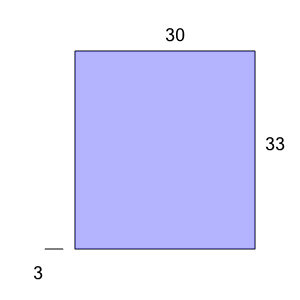This math topic focuses on calculating the perimeter of rectangles. It involves using problem-solving skills to determine how many smaller line segments can completely wrap around a larger rectangular shape. Each question presents a visual representation of the rectangle with varying dimensions and multiple-choice answers for students to select from. This forms part of a broader unit aimed at understanding area and perimeter basics.
Work on practice problems directly here, or download the printable pdf worksheet to practice offline.
morePerimeter of a Rectangle - Segment Coverage from Length and Width Worksheet

| Math worksheet on 'Perimeter of a Rectangle - Segment Coverage from Length and Width (Level 3)'. Part of a broader unit on 'Area and Perimeter Logic - Intro' Learn online: app.mobius.academy/math/units/area_and_perimeter_geometry_logic_intro/ |
1

| How many of the small line segment will it take to wrap around the larger shape? |
a
| 30 |
b
| 34 |
c
| 6 |
d
| 42 |
e
| 78 |
f
| 18 |
2

| How many of the small line segment will it take to wrap around the larger shape? |
a
| 68 |
b
| 60 |
c
| 36 |
d
| 40 |
e
| 24 |
f
| 52 |
3

| How many of the small line segment will it take to wrap around the larger shape? |
a
| 16 |
b
| 76 |
c
| 40 |
d
| 36 |
e
| 24 |
f
| 44 |
4

| How many of the small line segment will it take to wrap around the larger shape? |
a
| 48 |
b
| 40 |
c
| 28 |
d
| 56 |
e
| 72 |
f
| 60 |
5

| How many of the small line segment will it take to wrap around the larger shape? |
a
| 34 |
b
| 18 |
c
| 42 |
d
| 30 |
e
| 14 |
f
| 50 |
6

| How many of the small line segment will it take to wrap around the larger shape? |
a
| 44 |
b
| 16 |
c
| 56 |
d
| 64 |
e
| 20 |
f
| 32 |
7

| How many of the small line segment will it take to wrap around the larger shape? |
a
| 68 |
b
| 24 |
c
| 40 |
d
| 12 |
e
| 48 |
f
| 76 |